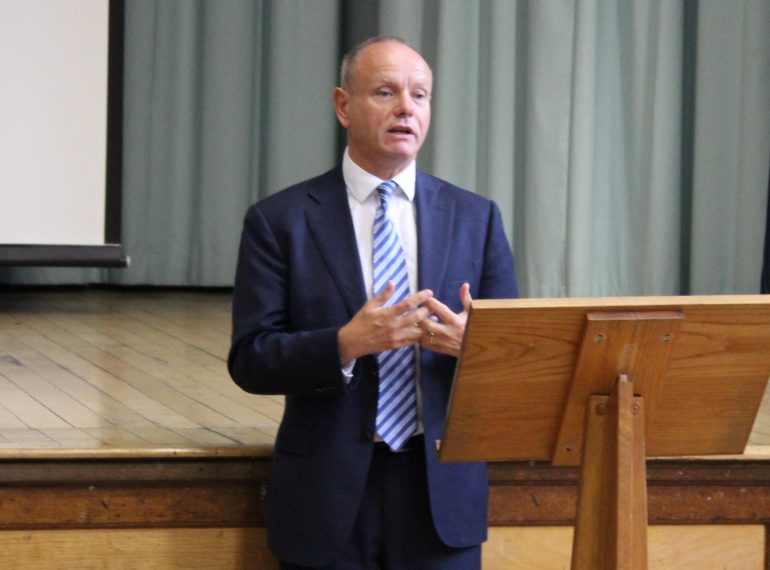Visiting MP eyes Brexit reality gap

Media reports about the extent of divisions within the parliamentary Conservative Party over the Brexit negotiations are well wide of the mark, MP Mike Freer told sixth-formers.
The Tory MP and former QE governor came into School to speak to Year 13 in a special assembly and responded robustly when asked whether he thought splits in the party would prevent the Government from winning any vote on Brexit.
“I sometimes feel as if I work at a different House of Commons to what I see portrayed in the media,” said Mr Freer, an Assistant Government Whip and MP for Finchley and Golders Green. He stated that the vast bulk of the Parliamentary Conservative Party supports the Prime Minister, adding that not only had she been a successful Home Secretary, but that she also knew Europe and understood that good deals inevitably happen at the very last minute.
And Mr Freer had another example of how perceptions of British politics can be affected by the media: he pointed out that although the chamber of the House of Commons usually appears quite empty on the BBC Parliament channel, this was because most of Parliament’s work was in fact conducted outside the chamber.
Mr Freer was on QE’s Governing Body when he was as a councillor in the London Borough of Barnet, where he served as Leader prior to running for Parliament. He spoke to the boys about the true role of MPs in the legislative process and about how to effect changes in public policy, before answering their questions on a wide range of political topics.
An MP’s job is to scrutinise the law, not make it, he explained. The law usually comes from the Government, which is the executive. However, there are a number of ways in which MPs can achieve a change in the law, through lobbying, questioning, building consensus, and trying to amend legislation as it progresses through Parliament. One approach is to hang an amendment on to a piece of legislation already tabled – known in the US as a Christmas tree bill. Westminster Hall debates – for which MPs sit in a horseshoe arrangement intended to encourage non-confrontational discussions – provide another opportunity to influence, he said.
Mr Freer recounted how he had secured changes to the law to:
- Make residential squatting illegal
- Remove ‘poppers’ from the list of drugs controlled under the Psychoactive Substances Act 2016 (having challenged the Department of Health’s evidence about their health impact).
- Make PrEP (Pre-Exposure Prophylaxis) available on the NHS. (PrEP is when people at very high risk for HIV take HIV medicines daily to lower their chances of getting infected.)
- Extend the Human Papilloma Virus (HPV) vaccine’s availability to include boys.
“Changing public policy is the most worthwhile thing about being an MP. I’m proud if I’ve stopped one person getting an HPV-related cancer,” he said.
Boys challenged Mr Freer in a number of areas during the Q & A session. He was asked, for example, “how do you reconcile the fact that your constituency voted for ‘remain’ with the Government’s position (that you are whipping)?”
“Easy! I’m a democrat,” he replied, adding that the Brexit referendum was the largest democratic vote in the country’s history and that all should therefore respect its outcome.
There were also questions on his voting record, including one on tuition fees. One sixth-former put a particularly thoughtful question about community relations: how did Mr Freer reconcile religious rights with the rights of other groups, such as the LGBT+ community, within such a diverse constituency. His answer was that trust is built over time as people get to know you as their MP and see you working hard for the local area; this allows you to disagree on particular issues without destroying those relationships.
After the assembly, Headmaster Neil Enright said: “This was a wide-ranging talk and set of questions, which engaged the boys and which will have aided their understanding of the political and legislative processes, not least in terms of gaining an insight into how MPs influence public policy. It is important that our pupils are able to consider a range of political perspectives on the key issues of the day and engage critically with them.”
